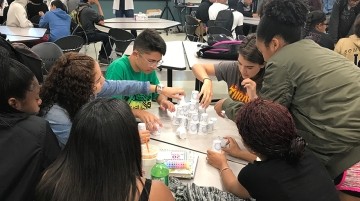Deeper Learning Networks: Taking Student-Centered Learning and Equity to Scale
Can teaching and learning practices that foster “deeper learning” among all students—not just the most advantaged—be successfully replicated across large numbers of schools? The answer is an unqualified “yes,” according to a new study released today by the Learning Policy Institute. The study examines how three school networks representing mostly students of color from low-income families have successfully taken student-centered learning and equity to scale.
Deeper learning approaches, including project-based learning, experiential work-based learning, and performance assessments, allow students to explore their interests in personalized and inquiry-based ways, learn core academic content, and develop key skills such as collaboration, communication, and critical problem solving that enable them to apply their knowledge in ways that prepare them for college, career, and citizenship. The new study, Deeper Learning Networks: Taking Student-Centered Learning and Equity to Scale, features three case studies and a cross-case report and brief that take an in-depth look at how three networks of schools successfully overcame major barriers to instituting complex teaching and learning practices in a variety of settings and enabled positive outcomes for their students. The networks—with a combined 271 schools and 90,000 students in the United States and abroad—are Big Picture Learning, the Internationals Network for Public Schools, and New Tech Network.
While each has its own distinct approach, the three networks – which work in partnership with districts, rather than as networks of charter schools -- have taken common steps to re-create their deeper learning models in new settings while adapting to the challenges and opportunities in local communities. These steps include:
- Designing whole schools with structures to personalize learning and to support equitable outcomes, including supports that address students’ academic and social- emotional needs;
- Collaborating with district, and community partners to implement network models in ways that develop a shared commitment to deeper learning and equity;
- Providing ongoing, multifaceted, and experiential professional learning that enables teachers and leaders to develop and improve their practice;
- Developing leaders who deeply understand and are committed to implementing network practices in new and existing sites; and
- Maintaining a learning orientation that allows the network and its affiliated schools to continually improve their designs to ensure quality and equity.
“There is no question that deeper learning approaches are fundamental to modern education,” said Learning Policy Institute President and Stanford Professor Emeritus Linda Darling- Hammond. “And yet, far too often these approaches are only available to affluent, students attending well-resourced schools. What we have learned from studying these three exemplary school networks is that systems can be put in place in sustainable, scalable ways that ensure all students—and especially traditionally underserved students—can experience high-quality learning that prepares them to succeed in the 21st century.”
Network Highlights
Big Picture Learning is a network of approximately 65 schools across 26 states and supports more than 100 schools internationally, including schools in Australia, Belize, Canada, Israel, India, Italy, the Netherlands, and New Zealand. It uses what they describe as interest-based learning in which students engage in hands-on learning through internships while further exploring their interests through personalized and interdisciplinary curriculum while they are in school. Students also develop portfolios of their work and participate in other authentic assessments that allow them to demonstrate their progress. They remain with the same advisor and student cohort for 4 years, building authentic and trusting relationships that support their progress.
The Internationals Network for Public Schools is a network of 27 schools situated within public school districts across the nation that serves secondary students who are recent immigrants and English learners. Their students come to the United States with widely variable levels of education. Internationals’ pedagogy also emphasizes a collaborative, inquiry-based learning approach that includes project-based learning and performance assessments. Using an interdisciplinary team structure, they integrate language development and content learning simultaneously. Content is taught in both English and students’ native languages, and the schools provide extensive wraparound services to meet the physical, social, and emotional needs of students and their families.
New Tech Network supports more than 200 elementary, middle, and high schools across 25 states in many geographically, politically, and socioeconomically diverse school settings. It offers a whole school model grounded in interdisciplinary project-based learning supported by technology and it partners closely with school districts to co-design schools that address local needs. The network provides districts and local educators with in-person and virtual workshops and a repository of curriculum and assessment models to build their understanding of deeper learning practices and the school designs and policies necessary for their implementation.
The study also offers a set of findings and implications for districts, schools, and educators seeking to expand access to deeper learning and equity in a wide range of settings. It shows how these school networks have successfully overcome traditional constraints to provide deeper learning that promotes equity on a large scale by focusing on multiple dimensions of change—structures to redesign schools and sustain deeper learning environments, partnerships with local stakeholders, robust systems of professional development, and systems for continuous improvement. Together, support the sustainability and growth of these deeper learning models over time.
The report and case studies are authored by Laura E. Hernández, Linda Darling-Hammond, Julie Adams, Kathryn Bradley, DeAnna Duncan Grand, Martens Roc, and Peter Ross. To read the full report and individual case studies on each of the school networks, visit https://learningpolicyinstitute.org/product/deeper-learning-networks.

